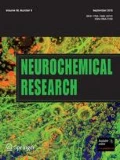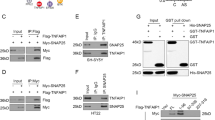Abstract
Autophagy is crucial for cell survival, development, division, and homeostasis. The mammalian target of rapamycin (mTOR), which is the foremost negative controller of autophagy, plays a key role in many endogenous processes. The present study investigated whether rapamycin can ameliorate surgery—induced cognitive deficits by inhibiting mTOR and activating autophagy in the hippocampus. Both adult and aged C57BL/6J mice received an intraperitoneal injection of rapamycin (10 mg/kg/day) for 5 days per week for one and a half months. Mice were then subjected to partial hepatectomy under general anesthesia. Behavioral performance was assessed on postoperative days 3, 7, and 14. Hippocampal autophagy-related (Atg)-5, phosphorylated mTOR, and phosphorylated p70S6K were examined at each time point. Brain derived neurotrophic factor (BDNF), synaptophysin, and tau hyperphosphorylation (T396) in the hippocampus were also examined. Surgical trauma and anesthesia exacerbated spatial learning and memory impairment in aged mice on postoperative days 3 and 7. Following partial hepatectomy, the levels of phosphorylated mTOR, phosphorylated 70S6K, and phosphorylated tau were all increased in the hippocampus. A corresponding decline in BDNF and synaptophysin were observed. Rapamycin treatment restored autophagy function, attenuated phosphorylation of tau protein, and increased BDNF and synaptophysin expression in the hippocampus of surgical mice. Furthermore, surgery and anesthesia induced spatial learning and memory impairments were also reversed by rapamycin treatment. Autophagy impairments and mTOR hyperactivation were detected along with surgery—induced behavioral deficits. Inhibiting the mTOR signaling pathway with rapamycin successfully ameliorated surgery-related cognitive impairments by sustaining autophagic degradation, inhibiting tau hyperphosphorylation, and increasing synaptophysin and BDNF expression.










Similar content being viewed by others
References
Moller JT, Cluitmans P, Rasmussen LS et al (1998) Long-term postoperative cognitive dysfunction in the elderly ISPOCD1 study. ISPOCD investigators. International Study of Post-Operative Cognitive Dysfunction. Lancet (London, England) 351:857–861
Fidalgo AR (2013) Experimental insights into age-exacerbated cognitive dysfunction after peripheral surgery. Aging Cell 12:523–524
Chang SY, Lee SN, Yang JY, Kim DW, Yoon JH, Ko HJ, Ogawa M, Sasakawa C, Kweon MN (2013) Autophagy controls an intrinsic host defense to bacteria by promoting epithelial cell survival: a murine model. PLoS ONE 8:e81095
Strohecker AM, Guo JY, Karsli-Uzunbas G, Price SM, Chen GJ, Mathew R, McMahon M, White E (2013) Autophagy sustains mitochondrial glutamine metabolism and growth of BrafV600E-driven lung tumors. Cancer Discov 3:1272–1285
Patel KK, Stappenbeck TS (2013) Autophagy and intestinal homeostasis. Annu Rev Physiol 75(1):241–262
Ro SH, Jung CH, Hahn WS et al (2013) Distinct functions of ulk1 and ulk2 in the regulation of lipid metabolism in adipocytes. Autophagy 9(12):2103–2114
Klionsky DJ, Emr SD (2000) Autophagy as a regulated pathway of cellular degradation. Science 290:1717–1721
Di Domenico F, Head E, Butterfield DA et al (2014) Oxidative stress and proteostasis network: culprit and casualty of Alzheimer’s-like neurodegeneration. Adv Geriatr 2014:1–14
Gratuze M, El Khoury NB, Turgeon A, Julien C, Marcouiller F, Morin F et al (2017) Tau hyperphosphorylation in the brain of ob/ob mice is due to hypothermia: importance of thermoregulation in linking diabetes and Alzheimer’s disease. Neurobiol Dis 98:1–8
Wong YC, Holzbaur ELF (2015) Autophagosome dynamics in neurodegeneration at a glance. J Cell Sci 128(7):1259–1267
Mohammadi M, Guan J, Khodagholi F, Yans A, Khalaj S, Gholami M et al (2016) Reduction of autophagy markers mediated protective effects of JNK inhibitor and bucladesine on memory deficit induced by Aβ in rats. Naunyn Schmiedebergs Arch Pharmacol 389(5):501–510
Wenzhen S, Keliang L, Jiawan W, Anshi W, Yun Y (2016) Activation of mTOR signaling leads to orthopedic surgery—induced cognitive decline in mice through β-amyloid accumulation and tau phosphorylation. Mol Med Rep 14(4):3925–3934
Yu X, Long YC, Shen HM (2015) Differential regulatory functions of three classes of phosphatidylinositol and phosphoinositide 3-kinases in autophagy. Autophagy 11(00):1711–1728
Crino PB (2016) The mTOR signalling cascade: paving new roads to cure neurological disease. Nat Rev Neurol 12(7):379–392
Xu Z, Dong Y, Wang H et al (2014) Age-dependent postoperative cognitive impairment and Alzheimer-related neuropathology in mice. Sci Rep 4:3766
Sarkar S (2013) Regulation of autophagy by mtor-dependent and mtor-independent pathways: autophagy dysfunction in neurodegenerative diseases and therapeutic application of autophagy enhancers. Biochem Soc Trans 41(5):1103–1130
Dioli C, Patrício P, Trindade R, Pinto LG et al (2017) Tau-dependent suppression of adult neurogenesis in the stressed hippocampus. Mol Psychiatry 22(8):1110–1118
Li X, Hu X, Wang J et al (2018) Inhibition of autophagy via activation of PI3 k/Akt/mTOR pathway contributes to the protection of hesperidin against myocardial ischemia/reperfusion injury. Int J Mol Med 42(4):1917–1924
Tramutola A, Triplett JC, Di Domenico F, Niedowicz DM, Murphy MP, Coccia R et al (2015) Alteration of mTOR signaling occurs early in the progression of alzheimer disease (ad): analysis of brain from subjects with pre-clinical ad, amnestic mild cognitive impairment and late-stage ad. J Neurochem 133(5):739–749
Perluigi M, Di Domenico F, Butterfield DA (2015) mTOR signaling in aging and neurodegeneration: At the crossroad between metabolism dysfunction and impairment of autophagy. Neurobiol Dis 84:39–49
Hovens IB, Schoemaker RG, van der Zee EA, Heineman E, Nyakas C, van Leeuwen BL (2013) Surgery—induced behavioral changes in aged rats. Exp Gerontol 48:1204–1211
Matsushita Y, Sakai Y, Shimmura M et al (2016) Corrigendum: Hyperactive mTOR signals in the proopiomelanocortin-expressing hippocampal neurons cause age-dependent epilepsy and premature death in mice. Sci Rep 6:27164
Hovens IB, Schoemaker RG, Heineman E, Nyakas C et al (2013) Surgery—induced behavioral changes in aged rats. Exp Gerontol 48(11):1204–1211
Zhang D, Li N, Wang Y, Lu W, Zhang Y, Chen Y, Deng X, Yu X (2019) Methane ameliorates post-operative cognitive dysfunction by inhibiting microglia NF-kappaB/MAPKs pathway and promoting IL-10 expression in aged mice. Int Immunopharmacol 71:52–60
Dasuri K, Zhang L, Keller JN (2013) Oxidative stress, neurodegeneration, and the balance of protein degradation and protein synthesis. Free Radical Biol Med 62:170–185
Sarkar S, Floto RA, Berger Z et al (2005) Lithium induces autophagy by inhibiting inositol monophosphatase. J Cell Biol 170:1101–1111
Majumder S, Richardson A, Strong R et al (2011) Inducing autophagy by rapamycin before, but not after, the formation of plaques and tangles ameliorates cognitive deficits. PLoS ONE 6:e25416
Zhu XC, Yu JT, Jiang T et al (2013) Autophagy modulation for Alzheimer’s disease therapy. Mol Neurobiol 48:702–714
Spilman P, Podlutskaya N, Hart MJ et al (2010) Inhibition of mTOR by rapamycin abolishes cognitive deficits and reduces amyloid-beta levels in a mouse model of Alzheimer’s disease. PLoS ONE 5:e9979
Perez SE, He B, Nadeem M et al (2015) Hippocampal endosomal, lysosomal, and autophagic dysregulation in mild cognitive impairment:corrleation with aβ and tau pathology. J Neuropathol Exp Neurol 74:345–358
Madeo F, Tavernarakis N, Kroemer G (2010) Can autophagy promote longevity? Nat Cell Biol 12:842–846
Laplante M, Sabatini DM (2012) mTOR signaling in growth control and disease. Cell 149:274–293
Huber KM, Klann E, Costa-Mattioli M, Zukin RS (2015) Dysregulation of mammalian target of rapamycin signaling in mouse models of autism. J Neurosci 35:13836–13842
Sun T, Liu Z, Liu M et al (2019) Hippocampus-specific Rictor knockdown inhibited 17β-estradiol induced neuronal plasticity and spatial memory improvement in ovariectomized mice. Behav Brain Res 17(364):50–61
Kim J, Kundu M, Viollet B, Guan KL (2011) AMPK and mTOR regulate autophagy through direct phosphorylation of Ulk1. Nat Cell Biol 13:132–141
Sancak Y, Bar-Peled L, Zoncu R, Markhard AL, Nada S, Sabatini DM (2010) Ragulator-Rag complex targets mTORC1 to the lysosomal surface and is necessary for its activation by amino acids. Cell 141:290–303
Rubinsztein DC, Codogno P, Levine B (2012) Autophagy modulation as a potential therapeutic target for diverse diseases. Nat Rev Drug Discov 11:709–730
Wong E, Cuervo AM (2010) Autophagy gone awry in neurodegenerative diseases. Nat Neurosci 13:805–811
Durán RV, Oppliger W, Robitaille AM, Heiserich L, Skendaj R, Gottlieb E, Hall MN (2012) Glutaminolysis activates Rag-mTORC1 signaling. Mol Cell 47:349–358
Chin RM, Fu X, Pai MY, Vergnes L, Hwang H, Deng G, Diep S, Lomenick B, Meli VS, Monsalve GC et al (2014) The metabolite α-ketoglutarate extends lifespan by inhibiting ATP synthase and TOR. Nature 510:397–401
Yoon WH, Sandoval H, Nagarkar-Jaiswal S et al (2017) Loss of nardilysin, a mitochondrial co-chaperone for α-ketoglutarate dehydrogenase, promotes mTORC1 activation and neurodegeneration. Neuron 4 93(1):115–131
Rohn TT, Wirawan E, Brown RJ et al (2011) Depletion of Beclin-1 due to proteolytic cleavage by caspases in the Alzheimer’s disease brain. Neurobiol Dis 43:68–78
Tramutola A, Triplett JC, Di Domenico F et al (2015) Alteration of mTOR signaling occurs early in the progression of Alzheimer disease (AD): analysis of brain from subjects with pre-clinical AD, amnestic mild cognitive impairment and late-stage AD. J Neurochem 133:739–749
Salminen A, Kaarniranta K, Kauppinen A et al (2013) Impaired autophagy and APP processing in Alzheimer’s disease: The potential role of Beclin 1 interactome. Prog Neurobiol 106–107:33–54
Manthari RK, Tikka C, Ommati MM et al (2018) Arsenic induces autophagy in developmental mouse cerebral cortex and hippocampus by inhibiting PI3 K/Akt/mTOR signaling pathway: involvement of blood-brain barrier’s tight junction proteins. Arch Toxicol 92(11):3255–3275
Yu Z, Ma J, Li X et al (2018) Autophagy defects and related genetic variations in renal cell carcinoma with eosinophilic cytoplasmic inclusions. Sci Rep 8:9972
Caccamo A, Magri A, Medina DX et al (2013) mTOR regulates tau phosphorylation and degradation: implications for Alzheimer’s disease and other tauopathies. Aging Cell 12:370–380
Shen W, Ganetzky B (2009) Autophagy promotes synapse development in Drosophila. J Cell Biol 187:71–79
Morrison JH, Baxter MG (2012) The ageing cortical synapse: hallmarks and implications for cognitive decline. Nat Rev Neurosci 13:240–250
Sundberg M, Tochitsky I, Buchholz DE et al (2018) Purkinje cells derived from TSC patients display hypoexcitability and synaptic deficits associated with reduced FMRP levels and reversed by rapamycin. Mol Psychiatry 23(11):2167–2183
Singh AK, Kashyap MP, Tripathi VK et al (2017) Neuroprotection through rapamycin-induced activation of autophagy and PI3 K/Akt/mTOR/CREB Signaling against amyloid-β-induced oxidative stress, synaptic/neuro transmission dysfunction, and neurodegeneration in adult rats. Mol Neurobiol 54(8):5815–5828
Luo R, Su LY, Li G et al (2019) Activation of PPARA-mediated autophagy reduces Alzheimer disease-like pathology and cognitive decline in a murine model. Autophagy 22:1–18
Bjorkholm C, Monteggia LM (2016) BDNF—a key transducer of antidepressant effects. Neuropharmacology 102:72–79
Weichhart T (2012) Mammalian target of rapamycin: a signaling kinase for every aspect of cellular life. Methods Mol Biol 821:1–14
Gao J, Xiong B, Zhang B et al (2018) Sulforaphane alleviates lipopolysaccharide-induced spatial learning and memory dysfunction in mice: the role of BDNF-mTOR signaling pathway. Neuroscience 388:357–366
Author information
Authors and Affiliations
Corresponding author
Ethics declarations
Conflict of interests
All authors declare that they have no conflict of interests
Additional information
Publisher's Note
Springer Nature remains neutral with regard to jurisdictional claims in published maps and institutional affiliations.
Rights and permissions
About this article
Cite this article
Jiang, Y., Zhou, Y., Ma, H. et al. Autophagy Dysfunction and mTOR Hyperactivation Is Involved in Surgery: Induced Behavioral Deficits in Aged C57BL/6J Mice. Neurochem Res 45, 331–344 (2020). https://doi.org/10.1007/s11064-019-02918-x
Received:
Revised:
Accepted:
Published:
Issue Date:
DOI: https://doi.org/10.1007/s11064-019-02918-x




